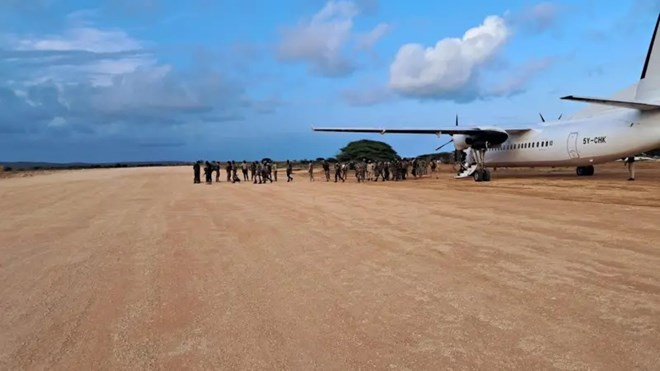
Wednesday November 27, 2024

Somali Federal Government troops disembark from a transport plane in Raaskambooni, Lower Jubba, as part of a strategic deployment to assume control from ATMIS forces and bolster security in the region. (Photo courtesy: [Source/SONNA])
Mogadishu (HOL) — The Somali federal government has deployed Turkish-trained elite forces in Raskamboni, a remote settlement in Lower Jubba, signalling a calculated move to assume control from African Union Transition Mission in Somalia (ATMIS) forces. The deployment comes amid heightened tensions between Mogadishu and Jubaland President Ahmed Madobe, whose recent re-election remains unrecognized by the federal government. The Somali leadership accuses Madobe of undermining constitutional reforms aimed at centralizing authority and transitioning to universal suffrage.
Somali officials confirmed on Tuesday that an additional 80 soldiers from Jubbaland's state forces have joined Somali federal troops during a military operation against Al-Shabaab.
The military maneuvers is emblematic of the broader political feud between Somalia's federal government and Jubaland. President Ahmed Madobe, re-elected in a contentious regional parliamentary vote that Mogadishu refuses to recognize, accuses the federal government of attempting to destabilize his administration. In turn, Somali President Hassan Sheikh Mohamud has criticized Madobe for resisting constitutional reforms to transition to universal suffrage and centralized governance.
On Wednesday, the tension reached a crescendo when courts in Mogadishu and Jubaland issued mutual arrest warrants. Madobe was accused of treason, collusion with foreign governments, and undermining national security, while Mohamud faced charges of rebellion, inciting conflict, and violating constitutional governance. Analysts view these legal actions as symbolic of the deepening mistrust between the two administrations.
Perched on Somalia's southernmost edge, Raskamboni lies 274 kilometres south of Kismayo and near the Kenyan border. Dense forests and natural fortifications define the area, historically used as a base by various armed groups.
The deployment of federal troops follows ATMIS's phased withdrawal, which has created a security vacuum in key regions previously secured by Kenyan forces. Lieutenant Colonel Hassan Adan Mohamed Hassan Iraqi, commander of the Gorgor unit's 18th Battalion, stressed the mission's importance in stabilizing Raskamboni and preventing insurgent threats. The troops, trained in advanced counterinsurgency tactics, were airlifted from Mogadishu on Monday.
Over the years, the settlement has housed the Islamic Courts Union during Ethiopia's 2006 intervention, Ahmed Madobe's Raskamboni Brigade, and later, Al-Shabaab. ATMIS forces, primarily from Kenya, now control the area, though their mandate is set to wind down.
While the government cites the need to take over ATMIS duties, analysts suspect political calculations. Jubaland President Ahmed Madobe, a key rival of Mogadishu, has maintained control over Kismayo and much of the region since his election in 2012.
"The deployment could signal Mogadishu's intent to establish an alternative authority in Raskamboni, undermining Jubaland's leadership," said Abdifitah Hassan Afrah, a veteran Somali politician.
Ahmed Madobe, re-elected in a controversial regional parliamentary vote, has accused the federal government of using military operations to destabilize Jubaland. In a fiery speech of defiance following his inauguration, Madobe asserted his authority over the region and vowed to counter any federal interference.
Jubaland forces have reportedly mobilized in Raskamboni to counter the federal deployment, raising fears of a potential military standoff. Analysts warn that the ongoing rivalry between Mogadishu and Kismayo could undermine national stability and complicate efforts to combat Al-Shabaab, which remains active in the region.
"When federal and Jubaland forces are divided, Al-Shabaab benefits," Afrah noted. "This could allow them to reclaim lost territory."
Kaboole echoed these concerns, adding that the withdrawal of ATMIS troops could create a power vacuum. "If federal and Jubaland forces fail to coordinate, Al-Shabaab will exploit the chaos to expand its influence."
The Ogaden National Liberation Front (ONLF) has called for restraint from all parties, urging dialogue to prevent further escalation. In a press release, the group highlighted the risks posed to civilians and warned that Al-Shabaab could exploit the political and military instability.
"The unfolding crisis threatens not only Jubaland but the stability of the entire region. We call on all stakeholders to work towards unity and reconciliation," the statement read.
Many fear that failure to de-escalate tensions could result in a wider conflict, jeopardizing progress in the fight against Al-Shabaab and threatening regional stability.